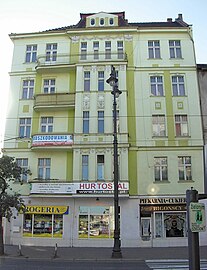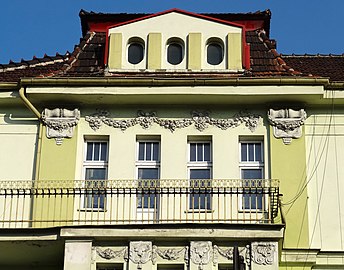Otto Riedl Tenement
| Otto Riedl Tenement | |
|---|---|
Polish: Kamienica Otto Riedla w Bydgoszczy | |
 Tenement from Gdanska Street | |
 | |
| General information | |
| Type | Tenement |
| Architectural style | Modern architecture |
| Location | 2 Świętojańska Street, at the intersection with Gdańska Street, Bydgoszcz, |
| Coordinates | 53°7′56″N 18°0′34″E / 53.13222°N 18.00944°E |
| Groundbreaking | 1911 |
| Completed | 1912 |
| Client | Otto Riedl |
| Technical details | |
| Floor count | 5 |
| Design and construction | |
| Architect(s) | Paul Sellner |
Otto Riedl Tenement is a habitation building located at 2 Świętojańska Street, in Bydgoszcz, Poland.
Location
[edit]The building stands on the western side of Gdańska street at the intersection with Świętojańska Street. It stands close to remarkable tenements in the same street:
- Tenement at 71 Gdanska street;
- Tenement at 75 Gdanska street;
- Ernst Bartsch tenement at 79;
- Paul Storz Tenement at 81;
- Rudolf Kern Tenement.
History
[edit]The house was built in 1911–1912[1] for the baker (German: bäckermeister) Otto Riedel, according to a design by the architect Paul Sellner.
Paul Sellner has been a student of the architect Karl Bergner. In 1904, he opened his own architectural study office in Bromberg, where he stayed at least until 1922.[2] In Bydgoszcz Paul Sellner also designed, the building at Gdanska Street 95 in 1912–1913.
Otto Riedel moved to Świętojańska Street 2, then 48 Danzigerstrasse, in 1891[3] to establish his bakery. He had the house rebuilt in 1911–1912 and kept his business running in the new building.[4]
The edifice also housed a hardware store, German: Engelhardt Droguen since 1915.[4] Otto Riedel lived there until at least 1933. There is still today a hardware store ("Drogeria Aster") at this address.
Vincent Bigoński established here his bakery in 1924.[5] After his death, his son and now his grand-niece have been running the shop at Gdańska Street till 2020.[6]
Architecture
[edit]The house reflects the architectural characteristic of years 1900–1910, as far as early Modern architecture is concerned.[2]
The building block is massive, in that way it balances the symmetry with the opposite building.
Both facades have a modest decoration but it is underlined by various components (pilasters, balconies).
Gallery
[edit]-
Advertising for Bigoński bakery in the 1930s
-
View from Swietojanska street
-
Facade onto Gdańska street
-
Facade detail
-
Detail of the roof
-
Relief detail
See also
[edit]References
[edit]- ^ Gminna Ewidencja Zabytków Miasta Bydgosky. Bydgoszcz: Miasta Bydgoszczy. 24 April 2013. p. 131.
- ^ a b Bręczewska-Kulesza Daria, Derkowska-Kostkowska Bogna, Wysocka A (2003). Ulica Gdańska. Przewodnik historyczny. Bydgoszcz: Wojewódzki Ośrodek Kultury w Bydgoszczy. ISBN 8386970103.
- ^ Adressbuch nebst allgemeinem Geschäfts-Anzeiger von Bromberg und dessen Vororten auf das Jahr 1891 : auf Grund amtlicher und privater Unterlagen. Bromberg: Dittmann. 1891.
- ^ a b Adressbuch nebst allgemeinem Geschäfts-Anzeiger von Bromberg und dessen Vororten auf das Jahr 1915: auf Grund amtlicher und privater Unterlagen. Bromberg: Dittmann. 1915. p. 68.
- ^ Bydgoszcz Guide. Bydgoszcz: City of Bydgoszcz. July 2014. p. 1851. ISBN 83-917786-7-3.
- ^ mc (17 March 2021). "Czy piec z piekarni Bigońskich będzie atrakcją Spichrza Mącznego? Negocjacje w toku". bydgoszcz.wyborcza.pl. Agora SA. Retrieved 12 May 2021.
Bibliography
[edit]- (in Polish) Bręczewska-Kulesza Daria, Derkowska-Kostkowska Bogna, Wysocka A. (2003). Ulica Gdańska. Przewodnik historyczny. Bydgoszcz: Wojewódzki Ośrodek Kultury w Bydgoszczy. ISBN 9788386970100.
External links
[edit]- (in Polish) Newspaper article on the Bigoński family








